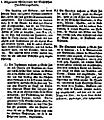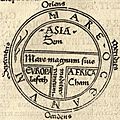Semites facts for kids
Semites was a word once used to describe people who spoke a Semitic language. These languages include Arabic and Hebrew. Today, scientists and scholars do not use "Semites" or "Semitic peoples" to describe groups of people. However, they still talk about "Semitic languages."
The word "Semite" comes from the name Shem. Shem was a son of Noah, as told in the Bible's Book of Genesis (chapters 6-11). The term was first used in the 1770s. It was created by German professors at Göttingen university.
Contents
Origin of the Word
The term "Semite" has a long history. It was created by scholars to group people based on their languages. These languages were believed to come from a common ancestor. The idea was linked to the biblical story of Noah's sons.
Shem and His Descendants
In the Bible, Shem is one of Noah's three sons. His brothers were Ham and Japheth. People in the past believed that different groups of people around the world came from these three sons. Those who spoke Semitic languages were thought to be descendants of Shem.
Early Use by Scholars
The word "Semite" became known in the late 1700s. Johann Gottfried Eichhorn, a German scholar, used it to describe a group of related languages. This was part of a new way to study languages and their connections. It helped people understand how languages like Arabic and Hebrew were linked.
Why the Term Changed
Over time, the way people understood "Semites" changed. It started as a way to classify languages. But some people began to use it to describe a "race" of people. This idea of human "races" is now seen as unscientific.
Modern Understanding
Today, experts focus on language families. They study how languages are related. They do not use "Semites" to describe a group of people. This is because people from different backgrounds can speak Semitic languages. The term "Semitic" is now mainly used for languages and cultures.
Images for kids
-
An early drawing from 1771 showing people divided by the biblical sons of Noah: Semites, Hamites, and Japhetites.
See also
 In Spanish: Pueblos semitas para niños
In Spanish: Pueblos semitas para niños
 | Audre Lorde |
 | John Berry Meachum |
 | Ferdinand Lee Barnett |




